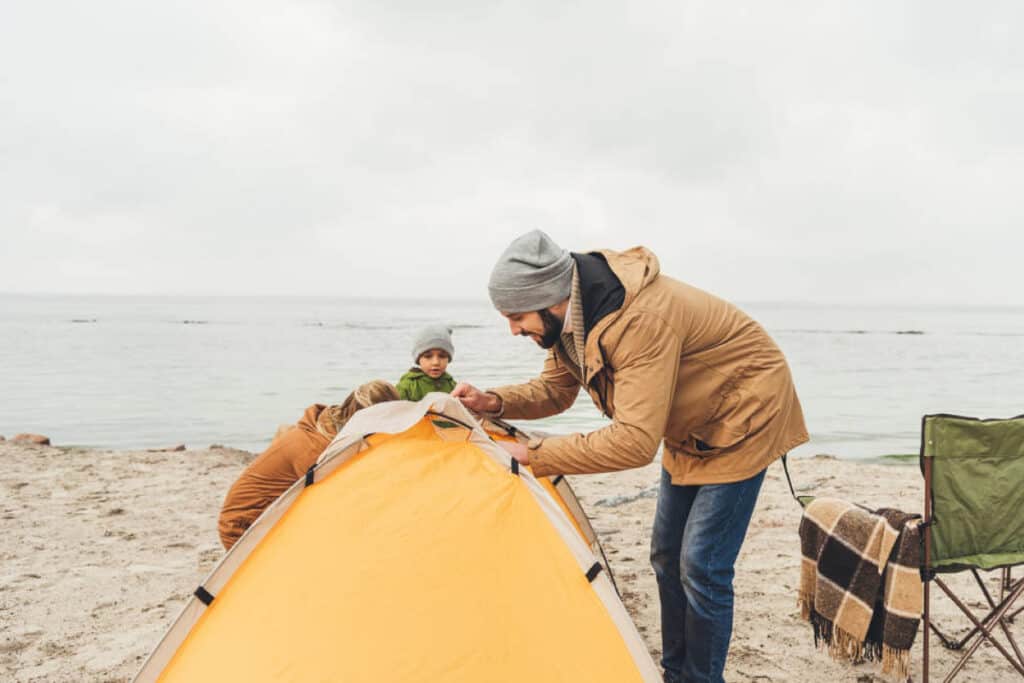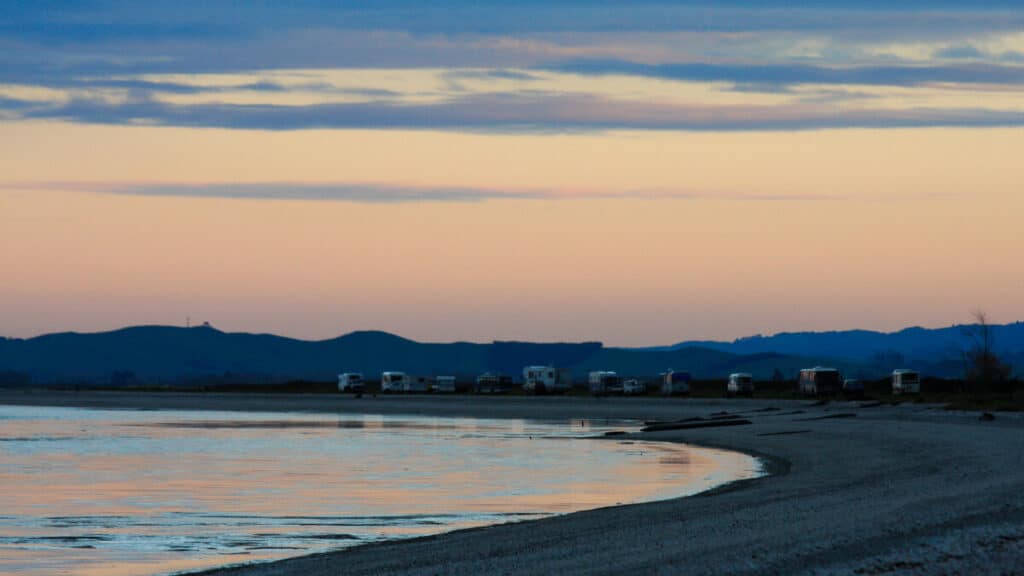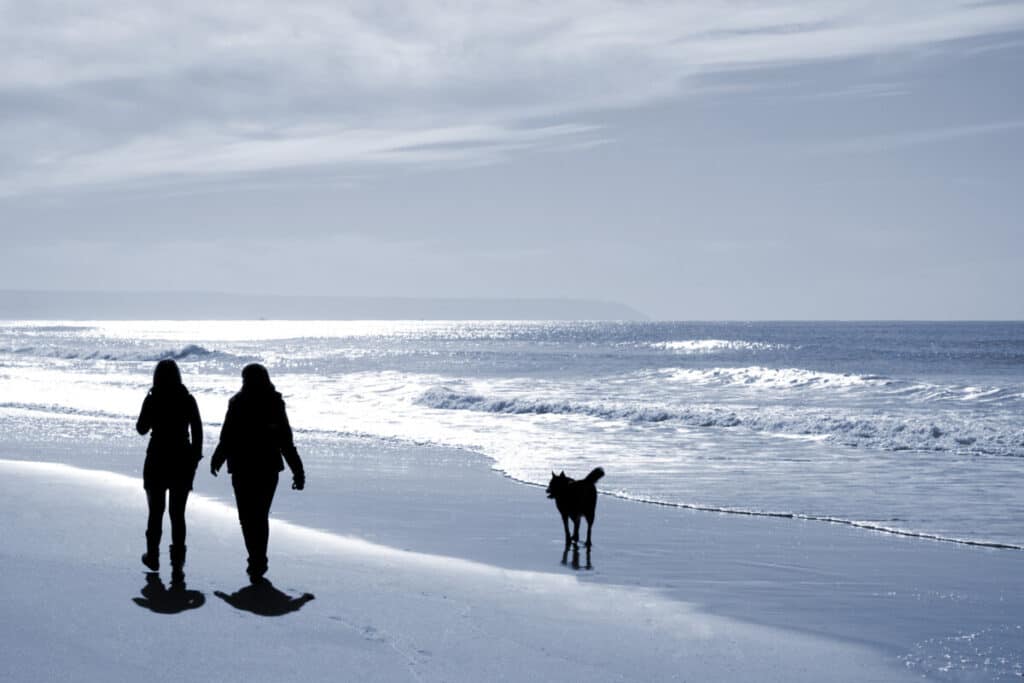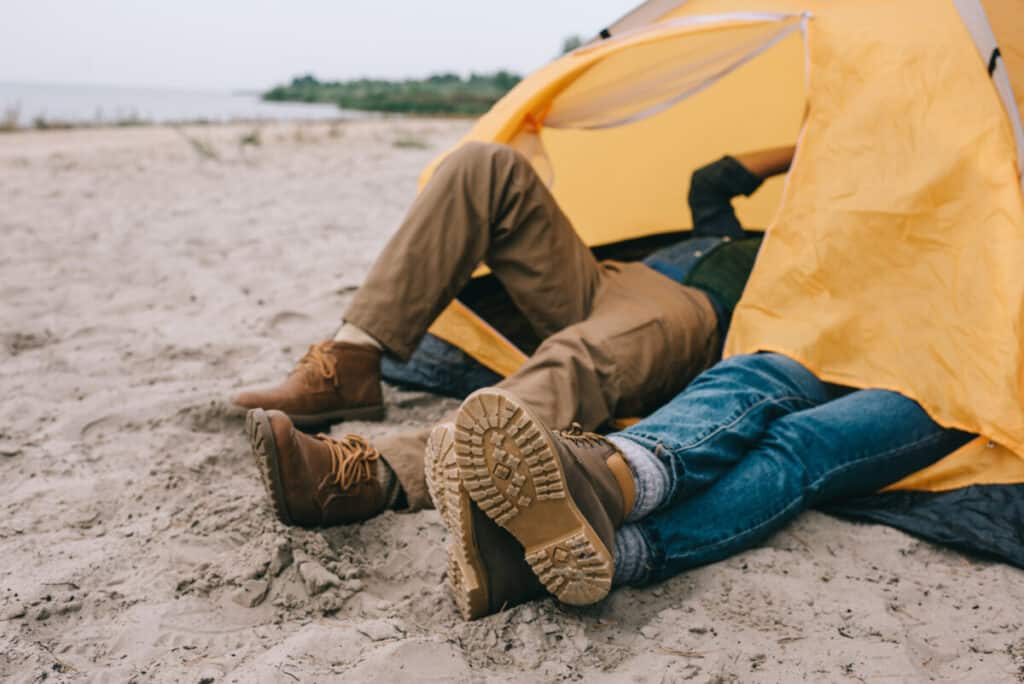A fire in the sand, the sound of waves lapping against the shore, the crisp smell of saltwater in the air, winter camping can be a worthwhile experience for anyone brave enough to try it. But is winter camping worth the effort?

Beach camping in the winter is worth it for many because it features cheaper campsites, fewer fellow campers, no bugs, and likelihood of seeing more wildlife. On the other hand, the temperatures may be cold, campsites and trails may be closed, and you’ll have less daylight.
Once you’ve decided if winter beach camping is for you, read on to discover the best tips for successful winter beach camping and where to find some of the best beach camping in the United States.
By the way, as an Amazon Associate, I earn when buying qualified products through links on my site.
Is It Worth Beach Camping During the Winter?
Beach camping in the winter isn’t just an excuse to buy cold weather gear. Even though you might not go swimming, there are some things that make camping on the beach during the winter worthwhile.
From whale migrations to elephant seal mating season, you’re likely to see some amazing wildlife. Not only could you get the chance to be one of the only campers on the beach, but the lack of campers allows for a silence you may never experience any other time
Beyond bragging rights, you’ll see beautiful starry nights without staying up late and getting eaten alive by bugs. If you’re willing to brave the cold and shortened days, you can even have a camp fire in the regions that have fire bans during the dry summer months.
I remember laying a tarp down on the sand on National Seashore, a beach a few hours away from me in Texas. Although it was nice and warm, we got eaten alive by sand fleas. I barely slept that night. #noregrets, the stars were amazing, though. If we were in colder weather, we wouldn’t of had this problem! That’s definitely an advantage of cold.
If you’re winter camping in the south, it may not even be that cold. On the Florida Keys, for example, some winter temperatures could be as warm as 70 degrees Fahrenheit. Or course, in other parts of the United States, some temperatures may be just above freezing and you’ll need that winter weather gear.
Where I am in Texas, it’s January 4th as I write this, and at Corpus Christi a couple hundred miles away it’s 55 degrees Fahrenheit. Great weather for camping!
(If you’re interested to know how to camp in 40-degree weather in general, check out our post here)
Pros Of Beach Camping In The Winter
Even though the weather is cold, there are some benefits to camping on the beach during the winter.
Cheaper Campsites
Many campsites have higher prices during peak season. During the winter, fewer people go camping, so the demand is not as high and the price of the campsites is less for some areas. What you might see is that some campsites have a peak-season price (typically during the more popular summer months) and an off-season price.

Unfortunately in the more mild weather the line between off-season and peak-season is a bit less clear. So, you may not save money in the winter.
Campsites At All
In 2020, if you tried to make a camping reservation, you might have experienced what we experienced many times. All the camping spots were booked out.
During the Spring and Summer, every spot was reserved a month in advance. (In Texas there isn’t an abundance of public land that you can just get up and go to).
We went camping recently and we were the only ones that were there. Then again, it was 30 degrees. If you want to read more about how to stay warm in 30 degree weather, we have a post about that, too.
Some beach campgrounds have specific spots (such as many in California). It could be only openings that are easy to reserve are during the winter months.
Fewer Campers
Camping on the beach during the wintertime will be less busy than during the summer. Without those noisy neighbors, the only sound you’ll hear at night is the lapping of the ocean and the sounds of wildlife.

There really is nothing like camping on an empty beach where the only thing you can hear is the roaring ocean and the wind.
Stargazing
Because the sun sets earlier, you will have more time to look at the night sky. If you’re lucky, you may even see the Northern Lights in some locations.
From KSDK, if you’re north of North Carolina or Northern California, you have a shot at seeing this amazing light show.
No Fire Bans
Ever been camping during a fire ban? Some places, such as California, only allow campfires during the winter and spring seasons. If you camp in the winter, you’ll avoid the dry-region’s fire bans.
Rules for beach fires vary from location to location–even if there isn’t a state-wide fire ban. Make sure to check the local rules of the beach or territory to ensure you don’t have to invite any local authorities to your campsite.
No Bugs
As I mentioned earlier, one of my beach camping trips was during the summer and we were eaten alive by sand fleas (may be the last time I try sleeping out of a tent at the beach).
Another camping experience I had was in the mountains, but the mosquitoes were so thick that even the half-inch of DEET we all wore barely deterred them from constantly brushing up against our faces.
If you’re willing to face the potential cold, you’ll enjoy a nice winter night without hundreds of bug bites and the smell of bug spray.
More Wildlife
Because there are fewer people, the area’s wildlife is more likely to be out and about. You’ll have a better chance of seeing deer, elk, coyotes, foxes, wolves, and more. From mid-December through January, gray whales migrate south, so you could get a chance to see them from shore. If you’re in California, you could see the elephant seals during their winter mating season.
Virginia, for example, has an annual month-long Winter Wildlife Festival, where birding takes on a new level. Who knows, maybe your winter camping trip could awaken new hobbies.
Cons Of Beach Camping In The Winter
Because you would be camping in what is considered to be the “off-season,” there are some problems that you’ll inevitably run into.
Cold Weather
When winter beach camping, you’re likely to encounter cold weather. Depending on where you camp, you may experience weather that’s just above freezing. Generally, temperatures are colder in the northern regions and warmer towards the southern coast.
Let’s be clear, 45 degrees isn’t too bad in normal conditions and most people can manage that, but at the beach 45 degrees with the inevitable wind that is at the ocean can be bitingly cold. Make sure and double and triple up on layers and take extra measures to handle wind chill.
In fact if there are unusually high winds when you go it might be best to stay home. Wind is no joke. Even if you bundle up a ton if you have a lot of wind it’s hard to enjoy anything.
Wetsuit Only Swimming?
Because the weather is cold, the ocean will be too. Many winter beach campers don’t go camping in the winter to swim, and because the air is cold, you probably won’t want to anyway.
That being said if you have proper gear such as a thick wetsuit. You might need a full 4mm-5mm wetsuit to be able to swim in these conditions, and even then it probably will be only for the extreme adventurer.
Closed Hiking Trails
Some hiking trails could be closed due to hunting season, snow, mud, or wet conditions. Before you make the trek to a trail, make sure to check local hiking blogs or trail reviews for the most current trail conditions.
Limited Campsites
Some campsites are only open for their peak seasons (usually from March/April to September/October) so your favorite place to camp in the summer may not be available. When looking for winter campsites, you’ll want to make sure the one you choose is open for year-round camping.
For example, in Massachusetts many parks are closed during the winter.
Less Daylight
During the winter, the sun rises later and sets earlier. If you plan on camping in the winter, you’ll have less daylight.
This isn’t a dealbreaker, just something to adjust your expectations. If you are planning on arriving in the evening and leaving in the morning, you might not see the sun at all!
12 Tips For Successful Winter Beach Camping
Whether you’re winter beach camping in the mild southern weather or the potentially blistering cold of northern states, there are some winter camping tips to always keep in mind, and then there are some tips that will really help the colder weather locations.
Check The Weather
Before you set out for your winter beach camping trip, always check the weather for winter storms and cold weather. Some winter storms will come in quickly, but you should always have a general idea of what the weather will be like so you can pack the right supplies.
The weather may also affect trails and roads, so make sure to check the local weather a few days before you leave for your trip so you know what to expect.
Sand Stakes
This is a tip that applies even if you’re beach camping in the summertime, but it’s still worth mentioning. One thing that is different about the beach is that your normal tent stakes will slide easily into the sand. The problem with this is that they will slide easily out with wind.
Sand tent stakes will keep your tent tethered to the ground without an issue.

If you don’t want to buy specialized sand stakes, you can actually get away with tying your tent to buried water jugs (you should bring those, anyway). Essentially you tie the tent to the handle of the water jug, bury the water jug about 6 inches, and follow the same process on all 4 corners.
Lube Your Tent Zipper
One thing you don’t want to face when it’s cold outside is to have to fumble with your tent zipper.
Why does this matter when you’re beach camping? Sand. Sand gets everywhere and your tent is unfortunately no exception. Sand is going to creep into the zipper.
The best course of action is to prevent this as much as possible, but it’s hard to totally avoid. You can at least make it a bit better by by rubbing wax or soap on your zipper to prevent the zipper from getting stuck.
A more intense lubricant is to use graphite powder (like this stuff on Amazon). This is used for locks where wet lubricants like oil can eventually jam the lock. I’d go for dry lubricant for zippers, personally. If you want to stay on the cheap you can even just rub a pencil (carefully) to lube the zipper.
Don’t Face The Ocean
This seems a little counterintuitive–“we came to the beach so we could see it!”
That’s fair, but the wind usually comes from the water, and wind carries sand. Even though sand will come into your tent (easier to just accept this now), you can face your door away from the ocean to prevent this a little bit better.
Bring Firewood
When we go camping, we don’t always bring firewood, but when you’re camping in the winter, especially somewhere near the beach where you’ll experience higher wind speeds, it’s really worth the effort.
Check your local laws ahead of time to make sure they’re okay with fires on the beach (laws vary from beach to beach)
Retract Awnings
Depending on your camp setup, you may have some extra wind/sun protection with awnings or other devices.
Remember that winds are more intense at the ocean and depending on the weather you may find the wind will take the awning wherever it wants. Get ahead of that greedy wind and retract your awnings when its not in use or when you start having high wind speeds.
Dress In Layers
When winter camping on the beach, always dress in layers. Your layers each serve a purpose and help keep you dry and warm. For the most success, campers should wear three layers. The base layer wicks moisture away from your body and keeps you dry; the middle layer is meant for insulation; and the outer layer protects you from wind, snow, and rain.
The best thing about layers is that you can put them on and take them off, so always pack more layers than you think you’ll need.
Choose A Spot Out Of The Wind
When choosing a spot to camp, find a place that has natural tree coverage or a hill so that you’re protected from the wind. If you’re hard pressed to camp on the sand, then check the weather to make sure there isn’t a storm coming, and make sure you’re far enough from the tide so that you stay dry. Unless the ground is frozen, your tent may also not be as secure in the sand as it would be in hard dirt.
Making Your Own Windscreen
Honestly the easiest way to block the wind is to actually put your tent right by your car. Not every beach campground allows you to drive onto the beach (probably most don’t), but your car will block a good amount of wind and that is super great for winter camping.
You can use a tarp as a windscreen as well, but you’ll need to get creative with tent stakes or buried objects to make sure it will stay in place in high wind conditions.
Stay Hydrated
Staying hydrated in cold months is just as important as during the hottest days of summer. Breathing in cold air speeds up dehydration because your body has to warm and moisten the cold air before it reaches your lungs. Dehydration can make you tired, make it harder to concentrate, and cause headaches.
If you’re active in cold weather, your body has to work even harder because you’re breathing harder. That being said, make sure you keep drinking that water.
If you’re craving something warmer, you can have a small camping stove on hand to make hot drinks such as coffee, hot chocolate, and tea.
Get Your Body Off The Ground
On cold nights, you want to get your body off the ground. You lose body heat when your sleeping bag is the only layer between you and the ground. By having one or more sleeping pads, you can insulate yourself and prevent heat loss. Sleeping pads are rated on an R-value scale from 1.0 to 8.0. Generally, you’ll want a sleeping pad that is rated 4.0 or higher for cold weather camping.
Remember also that a warm sleeping pad doesn’t mean a comfortable sleeping pad. Your sleeping pad’s ability to trap air and to insulate is what matters here. So even those foam closed-cell sleeping pads will make a big difference in warmth even if some of them aren’t that comfortable.
Multi-Season Gear
Even if the weather is mild during the day, it can get cold at night. By choosing a 3 or 4 season tent, you ensure that you’re protected should the weather get too cold.
If you’re camping in moderate weather, then a 3-season tent should be just fine. But if you’re expecting colder weather and snow, a 4-season tent may be the way to go because it’s made from heavier, more durable fabric.
Whether a tent is 4-season or 3-season doesn’t mean necessarily that the tent is thicker and provides any extra insulation, but a 4-season tent is built to withstand greater wind and snow pressures.
I might consider skipping out on the beach trip if you’re expecting snow at the beach (that’s a cooooooollllllld camping trip), but if you’re experiencing high winds constantly this might be worth looking into.
Where Should I Go For The Best Winter Beach Camping?
Whether you are looking for winter beach camping in the East Coast, Gulf Coast, or West Coast, you’ll find several great options.
Florida
Winter beach campers in Florida can find campsites (visitFlorida.com) on the East Coast, Florida Keys, and the Gulf Coast. During the winter months, many campers choose campsites in the Florida Keys due to the mild temperatures and activities such as snorkeling and ocean wading.
Camping is offered from full-service resorts on the mainland to private islands that are only accessible by boat. Because of the danger of high tide and for the protection of sea turtles and nesting birds, many of Florida’s campsites are found in areas that are just off the sand dunes, not on the beach itself.
Temperatures during the winter months:
- November: 75°F to 78°F
- December: 40°F to 65°F
- January: 35°F to 76°F
California
Winter beach camping in California offers many opportunities for all campers. Whether you are looking for a beautiful drive-in campsite or a week-long backpacking trip in the King Range National Conservation Area, (recreation.gov) California has something for everyone. In California, you can enjoy rustic trails and beautiful beaches. If you travel to Año Nuevo State Park you may even get the chance to see elephant seals during their winter mating season.
While the weather may be mild in some areas, it has a habit of changing rapidly. If you’re planning an epic backpacking trip, make sure to watch the weather for winter storms as your trip approaches.
Temperatures will vary drastically whether you plan to be in the north, central, or south parts of the state. If you are in the alpine region, your temperatures may approach 0 degrees Fahrenheit.
Temperatures during the winter months:
- November: 45°F to 65C
- December: 37°F to 68°F
- January: 30°F to 70°F
Oregon
If you’ve ever wanted to see whales in their natural habitat, then winter beach camping in Oregon may be the trip you’ve been waiting for. From mid-December to mid-January, thousands of whales travel past the Oregon coast. If you camp in Harris Beach State Park, you’ll get the chance to see harbor seals, sea birds, and other wildlife. This state park is close to Bird Island, which is the breeding grounds for rare birds, such as the tufted puffin.
Oregon offers many trails, miles of beaches, and beautiful sight-seeing regardless of the time of year.
Temperatures during the winter months:
- November: 27°F to 57°F
- December: 11°F to 55°F
- January: 11°F to 55°F
Texas
We live in Texas and we live a few hours from Corpus Christi. There are several beaches that are especially awesome because you can drive right onto the sand. This is ideal for cold-weather camping because you can park your car right in front of your tent and let your car block some of the wind.
Texas beaches are not especially famous for their beauty but the water is unusually warm in comparison to other beaches. South Padre is a very popular beach and isn’t as muddy as many of the other beaches are. If you want more information about camping on Padre island, check out the NPS website, here.
Average temperature of Corpus Christi (a coastal city in Texas)
- November: 58°F to 72°F
- December: 52°F to 67°F
- January: 48°F to 62°F
Sources:
Florida campsites: https://www.visitflorida.com/en-us/florida-beaches/florida-beach-camping-guide.html
California camping: https://www.recreation.gov/permits/72192
California camping: https://www.recreation.gov/camping/campgrounds/233116
Ano Nuevo State park: http://www.parks.ca.gov/?page_id=523
Oregon state park: https://stateparks.oregon.gov/index.cfm?do=park.profile&parkId=58
Dehydration in winter: https://www.wechu.org/sites/default/files/workplace%20wellness/be%20injury%20free/winter_hydration_ebulletin%20FINAL.PDF
General winter camping advice: https://www.rei.com/learn/expert-advice/winter-camping.html
Average temperatures stats for all states (look up state and then select climate): https://www.weather-us.com/en/georgia-usa-climate#:~:text=December%20is%20the%20beginning%20of,comfortable%20in%20the%20coastal%20areas.
